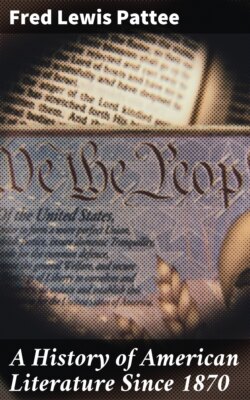Читать книгу A History of American Literature Since 1870 - Fred Lewis Pattee - Страница 38
На сайте Литреса книга снята с продажи.
VII
ОглавлениеTable of Contents
In his later years Harte's backgrounds became less sharp in outline. His methods grew more romantic; his atmospheres more mellow and golden. The old Spanish dream of the days of his early art possessed him again, and he added to his gallery of real creations—M'liss, Yuba Bill, Jack Hamlin, Tennessee's Partner—one that perhaps is the strongest of them all, Enriquez Saltillo, the last of a fading race. Nothing Harte ever did will surpass that creation of his old age. In Chu Chu, The Devotion of Enriquez, and The Passing of Enriquez we have the fitting close of the work of the romancer of the west coast. For once at least he saw into the heart of a man. Listen to Enriquez as he makes his defense:
Then they say, "Dry up, and sell out"; and the great bankers say, "Name your own price for your stock, and resign." And I say, "There is not gold enough in your bank, in your San Francisco, in the mines of California, that shall buy a Spanish gentleman. When I leave, I leave the stock at my back; I shall take it, nevarre!" Then the banker he say, "And you will go and blab, I suppose?" And then, Pancho, I smile, I pick up my mustache—so! and I say: "Pardon, señor, you haf mistake. The Saltillo haf for three hundred year no stain, no blot upon him. Eet is not now—the last of the race—who shall confess that he haf sit at a board of disgrace and dishonor!" And then it is that the band begin to play, and the animals stand on their hind legs and waltz, and behold, the row he haf begin.
It is the atmosphere of romance, for the mine which had caused all the trouble had been in the family three hundred years and it had become a part of the family itself. When it passed into the hands of the new régime, when his wife, who also was of the new régime, deserted him, then passed Enriquez. The earth that for three hundred years had borne his fathers opened at the earthquake and took him to herself. It was the conception of a true romancer. The work of Bret Harte opened and closed with a vision of romance, a vision worthy even of a Hawthorne.
